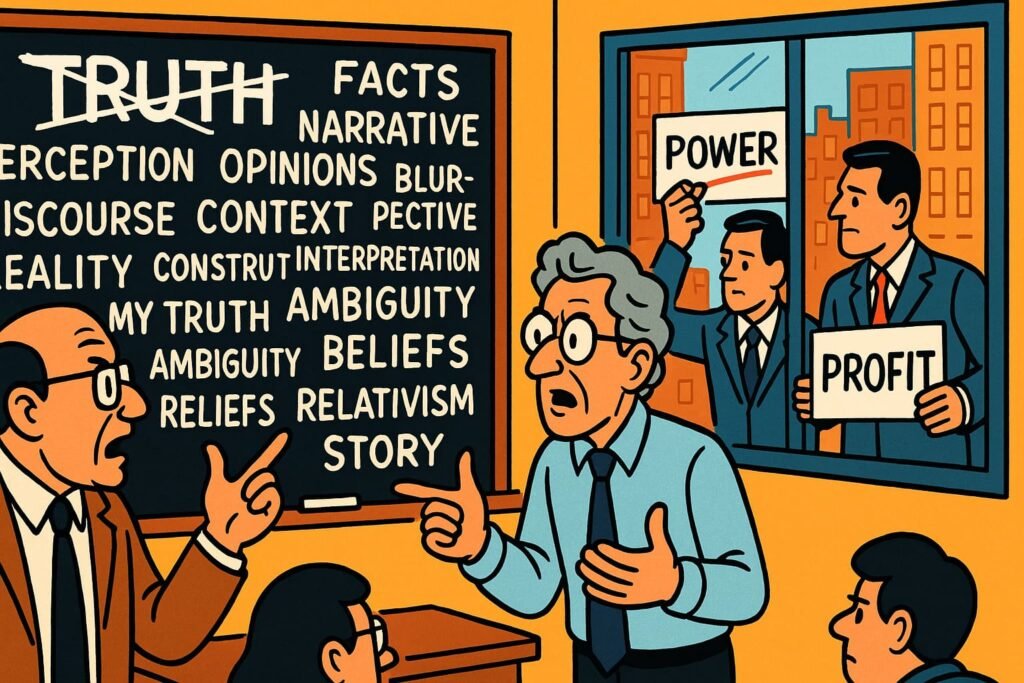Postmodernism – When Truth Became Optional
If you’ve ever wondered why debates today feel endless, confusing, and impossible to resolve, blame postmodernism. Born in universities in the mid-20th century, this philosophy argued that there is no single truth — only perspectives. What sounded like intellectual play in lecture halls has since bled into politics, media, and everyday life.
Postmodernism promised freedom from rigid thinking. Instead, it left us with a culture where facts are negotiable, language is endlessly dissected, and power hides behind “your truth” versus “my truth.”
What Is Postmodernism?
At its core, postmodernism challenges the idea of universal truths. It claims knowledge is shaped by culture, language, and power. On paper, that sounds clever. In practice, it has given activists, politicians, and corporations an excuse to twist reality to suit their agenda.
Once truth becomes relative, anyone can rewrite the rules. And they do.
The Death of Grand Narratives
Postmodern thinkers rejected “grand narratives” — the big stories that gave meaning to society, such as religion, progress, or even class struggle. Instead, everything became fragmented.
That fragmentation laid the groundwork for today’s endless identity battles. Without shared truths, society splinters into groups, each claiming their own reality. It’s liberation for some — chaos for everyone else.
Language as Power
Postmodernism insists that language doesn’t just describe reality — it creates it. That’s why so much of modern politics is obsessed with words. If you control language, you control thought.
This idea escaped academia and landed in HR departments, media outlets, and activist circles. Suddenly, the battle isn’t over jobs or wages, but whether you’ve used the “correct” terminology.
From Theory to Woke Politics
Postmodernism seemed harmless in the classroom. But once it mixed with activism, it became fuel for woke politics:
- No universal truth? Everyone’s personal truth counts more than facts.
- No shared reality? Groups fight over narratives instead of solving problems.
- Language as power? Endless culture wars over words and pronouns.
Postmodernism didn’t just undermine certainty — it undermined solidarity.
Why It Matters
Postmodernism turned politics into storytelling. Whoever controls the narrative wins. That’s why politicians and corporations embraced it: they can sell anything as long as they frame the story correctly.
Truth used to be a weapon against power. Now, truth is whatever power says it is.
Buzzwords of Postmodernism
Like every academic movement, postmodernism invented a vocabulary that later escaped the classroom:
- “Deconstruction” – pulling apart ideas, texts, or traditions until nothing stable remains.
- “Grand narratives” – the big shared stories (religion, progress, class struggle) dismissed as illusions.
- “Relativism” – the view that all perspectives are equally valid, even when they contradict.
- “Discourse” – conversations and language treated as the real battleground of power.
- “Your truth / my truth” – truth reduced to personal perspective, not shared reality.
These buzzwords sound sophisticated. In practice, they turned debate into word games and truth into branding.
Conclusion
Postmodernism promised freedom from rigid thinking but delivered endless confusion. It replaced shared truths with competing narratives, turned language into a weapon, and laid the foundation for today’s culture wars.
The question isn’t whether postmodernism exposed real biases — it did. The question is whether society can function when truth itself is up for grabs.
Next time you hear someone say, “that’s my truth,” remember: postmodernism made that possible — and power made it profitable.
For a deeper understanding of Critical Theory, check out our Critical Theory Explainer Hub.
FAQ Section
What is postmodernism?
It’s a philosophy that rejects universal truth, arguing knowledge is shaped by culture, language, and power.
Why is postmodernism controversial?
Because it undermines facts and shared reality, replacing them with competing perspectives that fragment society.
How did postmodernism influence woke politics?
It encouraged identity battles, culture wars, and the obsession with language by framing truth as relative.
Who benefits from postmodernism?
Politicians, media, and corporations — they can spin narratives as truth, keeping power while society argues.



